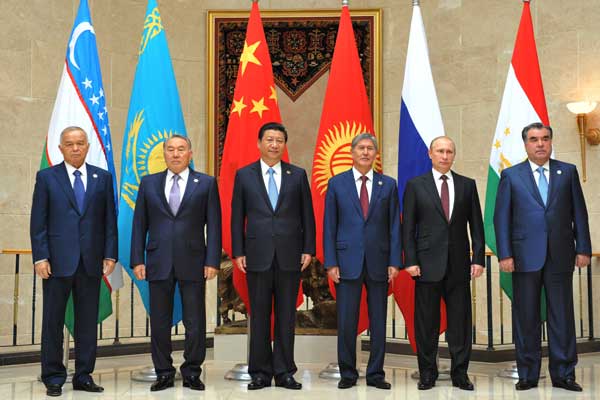

President Xi Jinping and his Russian and Central Asian counterparts attend a photocall at the Shanghai Cooperation Organization summit in Bishkek, Kyrgyzstan, on Friday. HUANG JINGWEN / XINHUA
Regional group supports China and Russia in opposing military intervention
China supports Russia's proposal that Syria hand over its chemical weapons to international control for their eventual destruction, President Xi Jinping said on Friday. [Special coverage]
An observer said the endorsement of Russia's idea by the Shanghai Cooperation Organization on Friday proves that Moscow and Beijing's stance of objecting to military intervention on the Syrian issue has won regional support.
Xi said at the 13th summit of the SCO in Bishkek, the Kyrgyz capital, "Beijing supports the international community in seeking a ceasefire and an end to violence and in mediating dialogue and negotiations."
Russia's last-minute initiative led US President Barack Obama to back away from planned military strikes in response to a chemical attack that allegedly left hundreds dead last month.
On Thursday, Syrian President Bashar al-Assad confirmed for the first time that his country plans to relinquish its chemical arms.
Xi asked both sides in the Syrian conflict to find a political solution.
He said China is ready to enhance communication and coordination through the UN Security Council, and will continue its unremitting efforts to bring about a political settlement.
Leaders at the SCO summit endorsed the idea of placing Syria's chemical weapons under international control and gradually destroying them.
They also called for an immediate end to the violence, the start of inclusive political dialogue as soon as possible and for an international conference to be convened.
Chen Yurong, a senior researcher at the China Institute of International Studies, said: "China and Russia have long held consistent stances on the Syria issue. They object to the use of armed force and outside intervention, and insist on respect of a country's sovereignty and the UN's leading role.
"We can see that Russia and China's stance has won widespread support."
At the SCO summit, the leaders also vowed to jointly fight terrorism, extremism and separatism, as well as drug smuggling and transnational organized crime.
Li Wei, director of the Institute of Security and Arms Control Studies at the China Institutes of Contemporary International relations, said the SCO is crucial for China's national security, because the most direct terrorist threat to China, "East Turkistan" forces, is spreading in the region.
Chen said security cooperation has always been the highest priority at SCO summits.
"The organization was originally established to protect stability in Central Asia. Now, the region is facing complex security challenges, including the impact from continuing turmoil in the Middle East and North Africa and the aftermath of US troops withdrawing from Afghanistan, which will be completed in 2014."
Terrorists have been increasingly active recently and have joined "East Turkistan" forces in causing a series of incidents in Central Asia and China's Xinjiang Uygur autonomous region.
Chen said there is a risk of further political turmoil in Afghanistan after 2014, which may have a direct impact on Central Asian countries.
Afghanistan-based terrorist groups might also penetrate Central Asia, while the drug problem in Afghanistan is also likely to get out of control and affect other nations in the region.
Chen said the SCO will promote reconciliation among various political powers in Afghanistan and introduce the country to multilateral programs under the SCO framework to help with its economic development.
Sun Zhuangzhi, an expert in Central Asian studies with the Chinese Academy of Social Sciences, said that of the six countries bordering Afghanistan, three are SCO members, while two are SCO observers.
"Even Afghanistan itself is an SCO observer."
The SCO was founded in 2001 in Shanghai by China, Russia, Kazakhstan, Kyrgyzstan, Tajikistan and Uzbekistan. Iran, Afghanistan, India, Mongolia and Pakistan have the status of SCO observers.
On Friday, Xi also suggested carrying forward the spirit of the Silk Road.
In a speech in Kazakhstan on Sunday, he proposed establishing a Silk Road Economic Belt, similar to the original, ancient Silk Road, to improve cooperation between China and countries in Europe and Asia.
Copyright ©1999-2018
Chinanews.com. All rights reserved.
Reproduction in whole or in part without permission is prohibited.